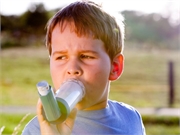- Could Your Grocery Store Meat Be Causing Recurring UTIs?
- Are You Making This Expensive Thermostat Error This Winter?
- Recognizing the Signs of Hypothyroidism
- 10 Strategies to Overcome Insomnia
- Could Artificial Sweeteners Be Aging the Brain Faster?
- Techniques for Soothing Your Nervous System
- Does the Water in Your House Smell Funny? Here’s Why
- Can a Daily Dose of Apple Cider Vinegar Actually Aid Weight Loss?
- 6 Health Beverages That Can Actually Spike Your Blood Sugar
- Treatment Options for Social Anxiety Disorder
Pick Summer Camps Carefully When Your Kid Has Allergies, Asthma

If you child has allergies or asthma, you need to take that into consideration when selecting a summer camp.
“Parents and kids alike who are dealing with asthma or severe allergies need to know there’s a good fit and that the child’s medical needs are being met,” said Dr. J. Allen Meadows, president of the American College of Allergy, Asthma and Immunology.
“Take the time to research camps you think your child will enjoy and ask the hard questions to make sure your child will be well cared for,” Meadows added in a college news release.
Consider a specialty camp, such as one specifically for children with asthma or one for those with food allergies. These camps provide specialized medical and nonmedical staff.
A day camp may be the best choice, Meadows said. Most day camps have measures to keep kids with allergies and asthma safe. Talk with staff about what your child can and cannot eat, and what they need to have on hand in case of a severe allergic reaction or an asthma attack.
Make sure the day camp has dealt with allergies and asthma before, knows where the nearest hospital is and how to get there, and is aware of the specific needs of your child.
Talk with your child’s allergist before deciding on a camp, Meadows added. The allergist may be able to suggest which type of program best suits your child, and can offer tips on communicating with camp personnel about your child’s medications and specific allergy or asthma treatments.
Your allergist should confirm that your child’s prescriptions are up to date, symptoms are under control and dosing hasn’t changed over the school year, and can also provide a personalized plan for your child that you can share with the camp.
You can help the camp staff and administration be prepared by informing them about your child’s health needs well in advance, Meadows said. For example, if asthma makes some activities difficult for your child, let counselors know.
More information
The Asthma and Allergy Foundation of America has more on allergies and asthma.
Source: HealthDay
Copyright © 2026 HealthDay. All rights reserved.










